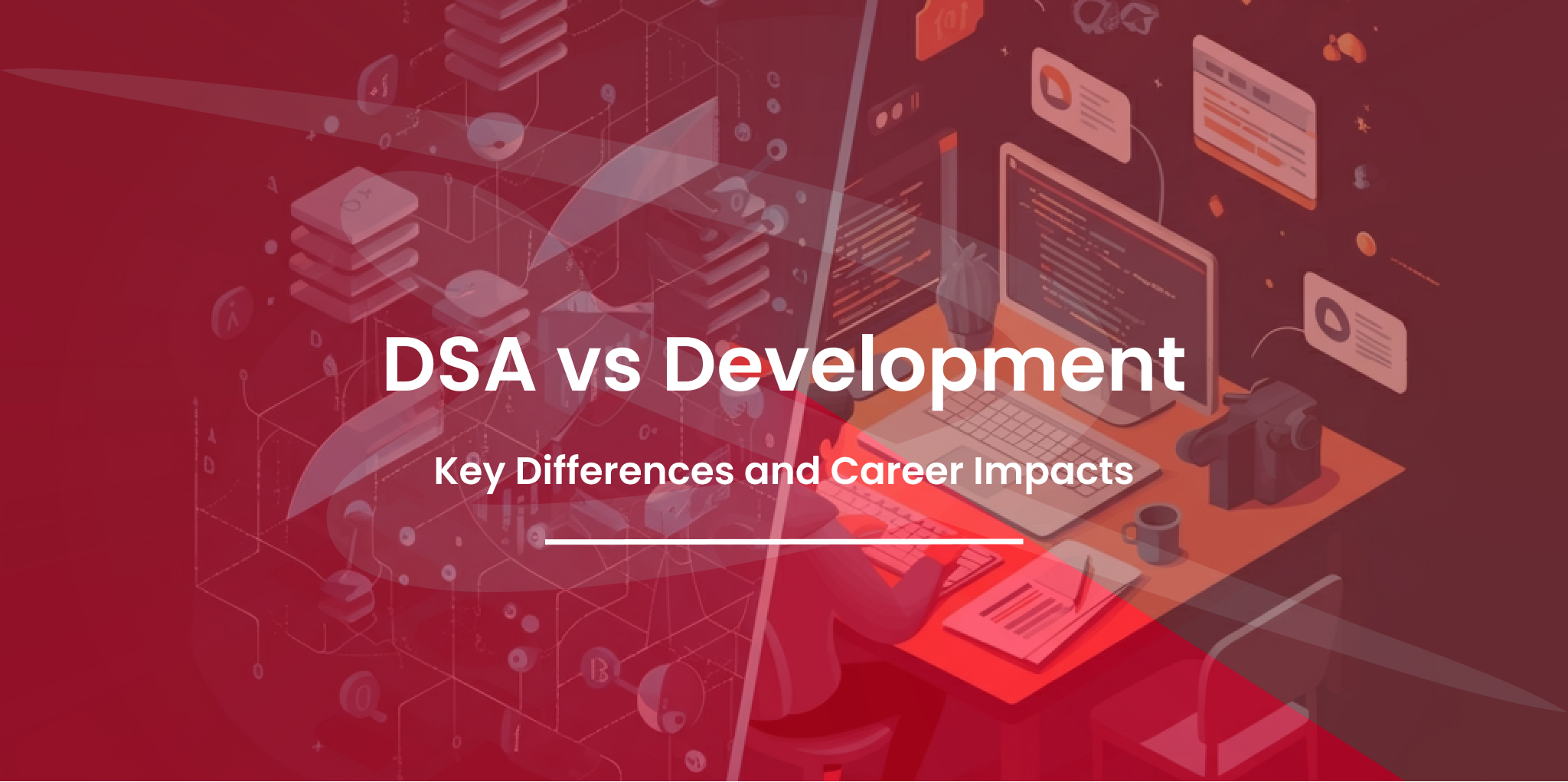DSA vs Development: Key Differences and Career Impacts
Understand the differences between DSA & Development, their career impacts, and how to choose the right path for your tech career.

What’s the best approach for advancing your tech career—focusing on Data Structures and Algorithms (DSA) or mastering Development? If you’ve been pondering this question, you’re not alone. For software developers, career switchers, and tech enthusiasts, deciding between these two paths can dramatically shape your professional future.
DSA and Development play distinct yet interconnected roles in the tech world. Understanding these differences will not only help you align your interests but also open new opportunities. Whether you're preparing for challenging coding interviews or building industry-leading applications, this guide will clarify your path.
By the end of this post, you will:
- Understand what DSA and Development are.
- Learn how they influence your career.
- Discover how to balance both skills for ultimate success.
Let's break it down.
What is DSA (Data Structures and Algorithms)?
To lay the foundation, Data Structures and Algorithms (DSA) refers to solving computational problems efficiently. But what exactly does that mean?
Definition:
DSA combines two critical components in computer science:
- Data Structures are ways to store and organize data (e.g., arrays, linked lists, trees, graphs).
- Algorithms are step-by-step instructions to process the data using logic (e.g., sorting and searching).
Why It’s Important:
Mastering DSA is about learning to think like a computer scientist. It’s the backbone of writing efficient, optimized code. This is why DSA is heavily emphasized in coding interviews, especially at top tech companies like Google, Amazon, and Meta (aka FAANG companies).
Common Concepts You Should Know:
- Arrays and Linked Lists
- Stacks and Queues
- Trees (e.g., Binary Trees)
- Graph Algorithms (e.g., Dijkstra's and DFS)
- Sorting and Searching Algorithms (e.g., QuickSort and Binary Search)
Use Cases:
Beyond interviews, DSA is crucial for:
- Competitive programming (think Codeforces, HackerRank).
- Optimizing backend systems in real-world applications.
- Tackling algorithm-heavy problems in data science or machine learning.
Expert Tip: "DSA teaches you how to break down complex problems step by step. This clarity extends to any coding task you’ll face." – John Rivera, Software Engineering Instructor.
What is Development?
Development, on the other hand, emphasizes building software and applications that solve real-world problems. Whether it’s designing a sleek app interface or creating robust backend systems, development affects what end-users interact with daily.
Definition:
Development refers to the process of creating functional, user-centric applications. It encompasses:
- Web Development: Building websites and web apps (frontend and backend).
- Mobile Development: Creating apps for iOS and Android.
- Software Engineering: Developing desktop software and enterprise solutions.
- Game Development: Crafting video games and interactive experiences.
Key Components of Development:
- Coding in utilities like Python, JavaScript, Swift.
- Using frameworks like React (frontend), Django (backend), and Flutter (mobile).
- Managing databases like MySQL or Firebase.
Use Cases:
- Launching a startup with a product-first approach.
- Working as a frontend/backend/full-stack developer.
- Freelancing to deliver website or app projects.
"I love seeing an idea come to life through code," shares Sarah Kim, Full-Stack Developer. "Development is incredibly tangible. You’re creating something people can use."
Key Differences Between DSA and Development
Now that we've defined both, you might be wondering, "How are they different?" Here's a side-by-side comparison of the key distinctions:
Purpose and Application
- DSA: Excel at optimization and computational problem-solving.
- Development: Create functional, user-friendly applications.
Skills Required
- DSA: Analytical thinking, mathematical reasoning, and algorithm optimization.
- Development: Coding, UI/UX design, and system architecture.
Learning Curve and Difficulty
- DSA: Heavily theoretical, abstract, and logic-driven. Intimidating for many beginners.
- Development: Practical, hands-on, with a blend of creativity and technical skills.
Tools and Platforms Used
- DSA: Platforms like LeetCode, CodeChef, and HackerRank dominate this space.
- Development: IDEs (e.g., Visual Studio), version-control systems (Git), and frameworks (React, Node.js).
Practical Tabular Comparison
Aspect | DSA | Development |
|---|---|---|
Purpose | Algorithm efficiency | Real-world application development |
Difficulty Level | High, requires logical thinking | Moderate, hands-on and creative |
Career Impact | Essential for competitive coding | Crucial for building applications |
Key Tools | LeetCode, CodeChef | React, Node.js, Git |
Stake in Career Growth
DSA drives mastery for challenging coding interviews, while Development equips you to build scalable systems.
Career Impacts of DSA vs Development
Let's examine how these two pillars affect your career trajectory.
DSA Career Path
- Coding Interviews: Essential for landing roles at leading companies like Google, Amazon, and Microsoft.
- Competitive Programming: Boosts your profile by excelling on platforms like Codeforces or ICPC.
- Specialized Roles: Backend engineering and algorithm-heavy positions depend on DSA.
Development Career Path
- Development Jobs: Frontend, backend, and full-stack roles are always in demand.
- Product Creation: Whether you’re joining a startup or freelancing, development empowers you to build tangible solutions.
- Creativity and Scale: Mobile apps, SaaS platforms, and enterprise solutions require development expertise.
An inspiring example: Elon Musk’s background in optimization (DSA) and application building (Development) allowed him to create scalable solutions like PayPal.
When to Focus on DSA
DSA should be your focus if:
- You're preparing for coding interviews at FAANG or top-tier tech enterprises.
- You enjoy competitive programming or problem-solving challenges.
- You're considering a research-driven career in algorithms or data science.
When to Focus on Development
Development is the right fit if:
- You want to work on real-world applications or products.
- Creativity and design excite you.
- You're interested in freelancing, startups, or application-centric roles.
Can You Master Both?
Spoiler alert—you don’t have to choose one over the other. Balancing DSA and Development can benefit your career immensely. Here’s how:
- DSA teaches problem-solving, which improves code efficiency in development projects.
- Development provides a hands-on perspective, helping you apply theoretical DSA concepts in real-world scenarios.
Recommended Learning Path:
- Start with basic DSA concepts (arrays, loops, sorting).
- Explore development frameworks—choose one for frontend (React) and backend (Node.js).
- Build product prototypes using your algorithms.
Balanced Career Impact:
Mastering both leads to full-stack development proficiency, putting you on the path to CTO-level leadership.
Real-World Success Stories
DSA in Action:
Alice Turner, now at Google, credits mastering DSA for cracking her coding interview. "LeetCode was my lifeline."
Development Wins:
Ethan Roberts started building mobile apps in college. Today, his Flutter-powered app boasts two million downloads worldwide.
Balanced Journey:
Sophia Lim, a full-stack engineer, believes in a hybrid approach. "Problem-solving from DSA and creativity from development made me a well-rounded coder."
Final Thought: Which Path Should You Choose?
Choosing between DSA and Development depends on your career goal:
- Choose DSA if you're aiming for elite coding interviews or algorithm-heavy roles.
- Choose Development if your passion lies in creating functional applications.
However, merging the two offers endless possibilities. Not only can you land premium positions, but you can also build products that shape industries.
Start small. Invest in platforms like LeetCode for DSA and React for Development. Experiment. Grow. And when in doubt, remember this quote from tech genius Linus Torvalds:
“Talk is cheap. Show me the code.”
FAQs: DSA vs Development
- Is DSA necessary for becoming a developer?
Not always. While Data Structures and Algorithms (DSA) are crucial for cracking coding interviews, especially at top tech companies, they are not mandatory for every developer role. Many development positions prioritize practical skills like web frameworks, UI/UX design, and database management. However, a solid understanding of DSA can improve problem-solving abilities and optimize application performance. - Can I get a job without mastering DSA?
Yes, you can. Many startups, agencies, and smaller tech companies focus more on development skills like React, Flutter, or backend frameworks rather than DSA expertise. However, if you're aiming for roles at companies like Google, Amazon, or Microsoft, mastering DSA becomes essential due to their rigorous algorithm-focused interviews. - Which is harder to learn: DSA or Development?
It depends on your learning style and interests. DSA is more abstract and mathematical, requiring strong analytical and problem-solving skills. It can be challenging for those who dislike algorithms and logical puzzles. Development, on the other hand, is more practical and creative, focusing on building real-world applications. Some find coding and design easier and more enjoyable, while others prefer the logical challenges of DSA. - Do frontend developers need DSA skills?
Not necessarily, but it helps. Frontend developers mainly focus on UI/UX, layouts, and client-side interactions, which require strong knowledge of HTML, CSS, and JavaScript frameworks. However, understanding basic data structures (like arrays, objects, and trees) and algorithms (like sorting and searching) can optimize frontend performance and improve coding efficiency. - How to manage DSA and Development together?
Balance is key. Allocate specific days for DSA practice (e.g., solving algorithms on LeetCode or HackerRank) and other days for development projects. Start by mastering fundamental DSA concepts (arrays, linked lists, stacks, queues) and gradually integrate them into your development tasks. Using version control (like Git) can help you keep track of both learning paths effectively. - Should I focus more on Data Structures or start with Web Development?
It depends on your career goals. If you aim to crack coding interviews at top tech companies, start with DSA, as they emphasize algorithmic problem-solving. However, if you're more interested in building products, working in startups, or freelancing, begin with web development. You can always learn DSA later to enhance your problem-solving skills. - Should I learn DSA or Development?
Ideally, learn both, but prioritize based on your goals. If you want to excel in competitive programming or ace coding interviews, focus on DSA first. For building real-world applications, product development, or starting your freelance journey, prioritize development. Mastering both can lead to full-stack roles and a well-rounded tech career. - How to manage DSA and Development together?
- Create a Learning Schedule: Dedicate specific days for DSA practice and others for development.
- Integrate Concepts: Apply DSA knowledge in development tasks, like optimizing algorithms in backend services.
- Leverage Projects: Build projects that require efficient data handling, such as e-commerce platforms or social media clones.
- Consistent Practice: Regularly solve coding challenges while continuing development work to maintain a balanced skill set.



Comments ()